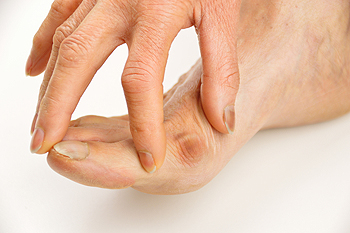 The medical condition that is referred to as arthritis may contribute to the development of bunions. Additionally, bunions can occur due to genetic factors, or from wearing shoes that do not have enough room for the toes to move freely in. Bunions are defined as bony growths that form on the side of the big toe and can cause pain and discomfort. Mild relief may be found when a protective pad is worn over the bunion, and larger shoes may need to be purchased. An X-ray may be performed to determine the severity of the bunion, and if it is large, and affects daily activities, surgery may be necessary for permanent removal. If you have developed a bunion, please consult with a podiatrist who can determine what the best course of treatment is for you.
The medical condition that is referred to as arthritis may contribute to the development of bunions. Additionally, bunions can occur due to genetic factors, or from wearing shoes that do not have enough room for the toes to move freely in. Bunions are defined as bony growths that form on the side of the big toe and can cause pain and discomfort. Mild relief may be found when a protective pad is worn over the bunion, and larger shoes may need to be purchased. An X-ray may be performed to determine the severity of the bunion, and if it is large, and affects daily activities, surgery may be necessary for permanent removal. If you have developed a bunion, please consult with a podiatrist who can determine what the best course of treatment is for you.
If you are suffering from bunion pain, contact one of our podiatrists of Lovely Foot Associates, PC. Our doctors can provide the care you need to keep you pain-free and on your feet.
What Is a Bunion?
Bunions are painful bony bumps that usually develop on the inside of the foot at the joint of the big toe. As the deformity increases over time, it may become painful to walk and wear shoes. Women are more likely to exacerbate existing bunions since they often wear tight, narrow shoes that shift their toes together. Bunion pain can be relieved by wearing wider shoes with enough room for the toes.
Causes
Symptoms
In order to diagnose your bunion, your podiatrist may ask about your medical history, symptoms, and general health. Your doctor might also order an x-ray to take a closer look at your feet. Nonsurgical treatment options include orthotics, padding, icing, changes in footwear, and medication. If nonsurgical treatments don’t alleviate your bunion pain, surgery may be necessary.
If you have any questions, please feel free to contact our office located in Johnstown, PA . We offer the newest diagnostic and treatment technologies for all your foot care needs.